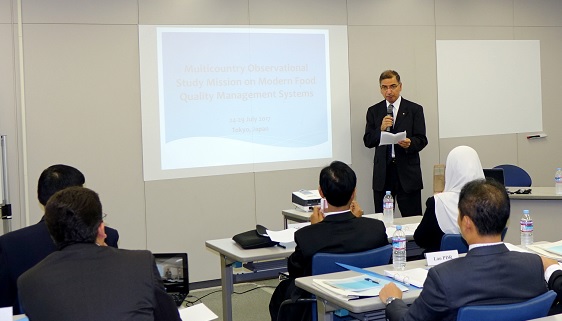
Select Page
The OSM exposes participants from member countries to modern food quality management systems, food regulations and safety standards in Japan.
Quality management systems ensure that food meets standards for hygiene, safety, and traceability throughout value chains. Food quality is often associated with its sensory, nutritional, and economic aspects but is also correlated with product safety.
To help member countries respond to increased consumer demand for high-quality food and implement modern quality assurance standards, the Asian Productivity Organization (APO) is organizing a six-day multicountry observational study mission (OSM) on Modern Food Quality Management Systems in Tokyo, 24–29 July 2017. The OSM is exposing participants from developing Asian countries to the food control regulations and quality standards in place in Japan.
In response to heightened consumer awareness of food safety and widespread distrust of increasingly complex global food value chains, governments are enacting stringent food quality regulations. While the food industry in APO member countries is willing to implement standards to meet regulatory requirements and earn public trust, a lack of clear understanding of current systems, as well as limited financial and human resources, impact the ability of food-processing SMEs to establish those systems.

APO Agriculture Department Director Dr. Muhammad Saeed speaking at the inaugural session of the multicountry observational study mission (OSM) on Modern Food Quality Management Systems in Tokyo, 24 July 2017.
The study mission was inaugurated by APO Agriculture Department Director Dr. Muhammad Saeed. In welcoming participants, he stated that the OSM had been designed to provide firsthand knowledge of best-in-class food quality and safety practices through a mix of lectures and field visits to food industry SMEs in the host country.
“The initiative will enable you to formulate strategic action plans for adopting the lessons and insights learned from the experience of Japan to enhance the capacity of the food industry in your countries,” he explained, adding that beyond the field visits, participants would also have opportunities to learn about food quality assurance practices as they visited stores and restaurants during their stay. “Personal experience as a consumer is important to understand the impact of the quality standards and processes the industry in Japan puts into practice,” he stressed.
The study mission is attended by 17 senior-level managers of food enterprises, officers of food-processing industry SMEs, food quality/safety management experts from industry, NPO consultants, academics, and government officers, representing 12 APO member countries. The OSM is funded under a special cash grant from the Government of Japan.
Five experts are leading the OSM: Dr. Teiji Takahashi, former representative of the UN Food and Agriculture Organization to Japan and former University of Tokyo Graduate School of Agricultural and Life Sciences lecturer; Professor of Safety Management in Food Supply Chains Dr. Goichiro Yukawa, Research Center for Advanced Science and Technology, Tokyo University of Marine Science and Technology; Food Hygiene Laboratory Team Leader Dr. Yasuhiro Inatsu, Food Safety Division, National Food Research Institute, National Agriculture and Food Research Organization; Managing Director and QAS Food Safety Auditor for IRCA Food Safety (ISO 22000) Shigeru Yoshida, Kamaichi Co., Ltd.; and APO Secretariat Agriculture Department Program Officer Mitsuo Nakamura.